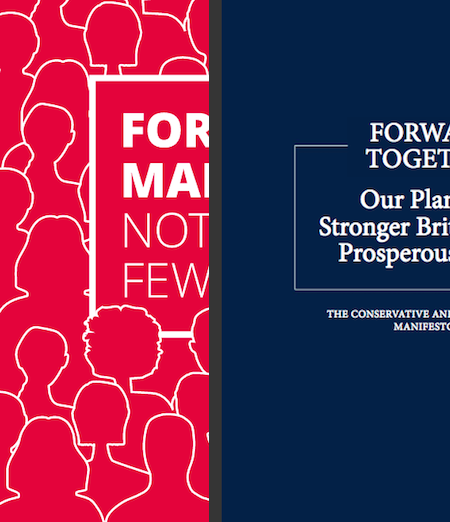-
An election devoid of ideas
Launching the 2017 Conservative Party election manifesto, Theresa May said that people are not ideological. That is to say that they are not wedded to theory, beliefs or ideals. I’m sad to say that she may be right. Former staunch Labour voters in the north are considering a switch to the Tories. That would have been enough to prompt a fist fight in the past. But not so now.
May’s speech is a remix of the individualist theory of Margaret Thatcher’s ‘no such thing as society’ speech, but applied to political thought rather than community. This is hardly a surprise, as this election (and UK politics in general) has been devoid of ideas.
The Labour Party manifesto is strangely lacking in ideas as a whole. This is not wholly unlinked to the problem that Labour has with its supporters knowing what they don’t want, but not what they do want. So, the manifesto is largely a rolling back of past legislation. Some of the ideas are laudable, but it is hard to sell reversion as anything but a harking back.
The Conservative manifesto is arguably more lacking in substance, but it does at least approach something novel in its attempt to rethink the way that social care is paid for. A 100% death duty on anything over £100,000 will pay for carers for the ill and the elderly where people need it. The burden falling squarely on those who use carers (or, more accurately, their children). It’s a safe and steady income stream for private healthcare companies and the financial sector.
It’s clever and it looks like accountability. In effect it is simply a gamble on future price rises of both housing and care. It could also unrealistically raise expectations of service, in much the same way that university fees have with education. Just ask any senior lecturer.
Of course, the biggest idea in UK politics of the last decade has been Brexit. It was simple, it was shouty and it was radical. It was also a stupid idea. But that has never stopped ideas from being popular. Everything since has paled in comparison.
The NHS and selling off council housing were big ideas, but both main parties have struggled to find anything to compare. This may be as much a signifier of the paucity of quality leadership candidates as it is a paucity of thinking. But one undoubtedly leads to the other.
-
Why do political parties create camels?
It is hard to be in the midst of a General Election campaign in the UK without considering the novel political ideas that are being put out there by the various parties. But the sad fact is that, perhaps as usual, they are largely absent.
Yes, political ideologies and parties are based upon ideas and draw from yet more – often dusty old manifestos and economics journals. But those standing for office seldom come up with anything original, or even inspiring. Why is this?
As someone with a background in idea creation who has worked with political factions, campaign groups and trades unions, it is not hard to see where the problems lie. Although changing things may be another challenge all together.
The small ‘c’ conservatism
Just as humans tend to be more conservative (with a small ‘c’) as they age, so do organisations. Radical activism or campaign groups take risks with ideas in their early days, often at the behest of a few key thinkers and doers. Often, they are thinking on their feet and being reactive. But as the group becomes established so its beliefs and behaviours become codified, often in written form.
Casting these tablets of wisdom aside then become a barrier to shifting focus or pace. Think of the amendment of Labour’s Clause IV and the fuss still made over that. The famous ‘when the facts change, I change my mind’ quote, most often credited to economist John Maynard Keynes, is not one that readily applies to established political groupings and parties.
Such groups are also most interested in preserving their and their members’ status. So, MPs will act in the best interests of getting MPs of their stripe re-elected, rather than finding ways to improve the lot of constituents with an idea that is outside their defined party view.
A horse designed by committee
Once parties become established, there are often set groups of people who can have ideas and set groups of people who can be seen to execute them. Anything novel will have to pass through these people, where it will often be ruined. Hence the analogy of a camel being a horse designed by committee.
An outsider comes up with the surefire-winner, thoroughbred mare that will win any race. But everyone wants their say and wants their piece of credit. You start out with an Aston Martin of an idea, but you end up with an Austin Allegro. It’s functional, but no one is going to excitedly share it on Facebook.
That is not to say that ideas should not be discussed or amended as you go. Some of my best work has come as a result of a to and fro with a client or an editor. But you need to distinguish between useful collaboration and useless ego.
First take the tablet
Ideas that are adopted by the main parties usually come from an established member of the hierarchy, or from a trusted expert who first has to show that they share the party’s views (and is willing to work for the vague promise of a seat in the House of Lords).
This makes some sense, as the businessman with an interest in Adam Smith will be able to suggest some policy ideas that are broadly Conservative Party-friendly and UKIP can cull ideas from a think tank founded by graduates of Dunning-Kruger University. But the best ideas often come from critical thinking, harsh reviews or those who suddenly have to think with restrictions (such as ideas they don’t follow). This allows objectivity and free thinking. Try it some time.
I shall be analysing party ideas and commenting on anything novel as the election campaign goes on. Let’s hope there are some new ones to review.
-
The closed hand
There has been a great deal of fuss in media and advertising publications this week about the new McDonald’s ad that is not a McDonald’s ad, even though it is. Still with me?
The story goes like this. Mindy Kaling, of the much-loved comedy The Mindy Project appears in a faux ad that mentions Coca Cola and Google, but never the burger chain that paid for the campaign. Instead, the ad instructs you to Google ‘that place where Coke tastes so good’. Oh, and Mindy (who is constantly hungry in the TV series) wears a yellow top and there is a red backdrop. Get it?
Make a fist
This obviously works on a subliminal level and it is squarely aimed at millennials, who are expected to have a Pavlovian response to the mention of food, drink and Google.It’s Derren Brown meets marketing.
But this also plays on an idea that I have long referred to as ‘the closed hand’. As anyone knows, if you make a fist and hold it up like there is something inside, then your children, dog or cat will want to see what is inside. Even adults will emit a Homer Simpson-esque ‘lemme see’ if you do it long enough.
By censoring their own name, McDonald’s do just that. They make you notice their name by not including it. We want to know. They also inspire a good deal of gossip in the trade press, on social media and from cultural commentators. It’s an idea that is easy to replicate and it can work across PR, advertising, campaigning and marketing if it is original and well executed.
The advertisement (or subvertisement, to borrow a counter-culture term) also gives you a dopamine reward hit. This is in much the same as Silk Cut ads or Smirnoff ads have in the past. You have to solve the riddle. You hit up Google and find out who they are talking about. Of course, you knew all along. You’re clever. Pat on the head.
The final thing that this campaign does well is simply being different. Of course, now other brands will ‘me too’ and try to copy it, badly. They ignore the fact that the difference is what caused the stir. I once saw advertising master Dave Trott explain this by illustrating ads as an ever-growing line of drawn circles, because circles sell. You sure notice when someone draws a square.
-
What is This Idea?
Ideas are at the centre of most of the things that we humans do, say and think. But not everyone is great at having them.
I am lucky enough to be paid to have ideas for a living, but I’ve not spoken much about that, until now. It was a service that I did for people via word of mouth. A few select clients asked me to cook up ideas and they would then come back to me for more ideas, for some words to go with them, or they would simply go off and execute them or use them for inspiration. Often, they have been people who also have great ideas of their own, or have staff who do. But sometimes you need a new injection of inspiration.
Ideas consultancy
This site serves as something of a portfolio for what I do and what I have done. It will focus on ideas both large and small – from the grand political philosophies of our age to trivial items of domestic design. The blog will look at how we have ideas, great ideas that are out there and ideas that we need right now. The other pages will focus on my own work and ideas.
The site will undoubtedly be UK-biased, but it will have a global outlook: taking in business, PR, advertising, politics and even sport. I hope you get the idea. That is, after all, the important thing.


